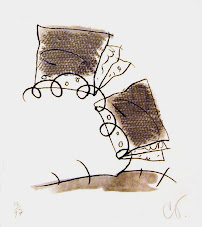Here is an attempt to summarize the second meeting…
Some of us who attended the first meeting came back for more – Heather, Kerry, Ian and Richard, and we were joined by Helen, Debs, Lynne, Justin, Harriet, Hattie and Leila, and following the birth of the blog we have also been joined by friends afar, Becky, Emily, Helen, Emma, Mark.…yes, Exnography, ugh is…Expanding (ugh, sorry I couldn’t help myself, it’s just so Extraordinarily Exciting). Most of us had read ‘You want to be careful you don't end up like Ian. He's all over the place': autobiography in/of an expanded field (the director's cut)’ by Ian Cook (he knows a thing or two about ethnography). There’s a link to the Ian’s paper somewhere over there, on the left hand side of page.
The expanded group opened these themes out (and then some), Ian’s paper led to a discussion about the expanded field...boundaries, borders, negotiation, masturbatory processes, rural others/selves, urban explorations, Bill Bunge, gangsters, evocation, institutions, classic monographs, irrational behavior…and much more. Explosive stuff…and we didn’t even touch on the Baxi Bermuda. We didn't get to talk about panic, though some of us wanted to.
So, negotiation was a key issue for many in the group, juggling real and perceived responsibilities to research participants, collaborators, funding bodies, supervisors, examiners etc. We discussed field boundaries and academic border control…how could we best negotiate the spaces between ‘institution’ and ‘out there’, work through our responsibility to others and to the integrity of our own work. It was felt that in cases where critical ethnographic research was necessary to fulfill commitments to research partners autoethnography was a method through which wider experiences could be tackled.
Within the academy, the politics of ethnographic research was still an issue, many of us felt that the traditional research model of ‘thinking – doing – writing’ was problematic (if not impossible) for our ethnographic projects. Spending a large amount of time immersed in theory prior to immersion in the field may be counter-productive, confusing, and often a waste of time. Other members of the group felt that a thick theoretical framework was important. A difference between being theoretically informed and theoretically framed – I guess!? In light of this discussion/debate some members of the group felt that it was important to read some classic monographs, others felt that more recent works were more useful...
So onward we go…we have another paper to read, Susanne Gannon (2006) The (Im)Possibilities of Writing the Self-Writing: French Poststructural Theory and Autoethnography. Cultural Studies Critical Methodologies 6/4. Those who wish to do so can bring selected readings that may be useful to our explorations, classic monographs not compulsory.
Lesson...in theory nothing goes to plan.
Please join-in, in either room 358 12 March 2pm or virtually in whatever room you choose.* Human Geography…for those of you who may have accidentally strayed into this blog.

1 comment:
Thanks for this Kerry. I've been meaning to read Susan Gannon's article for a while, so will post any comments I have before Wednesday. Hoepfully I will be able to make Meeting 4 in person!
Helen
Post a Comment